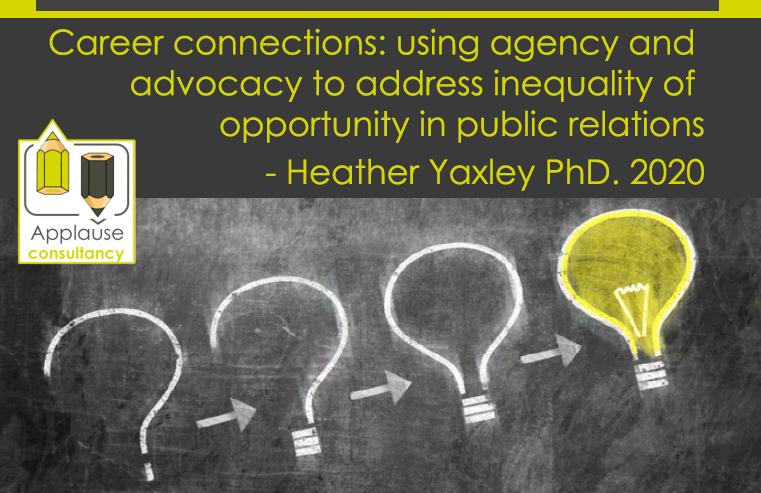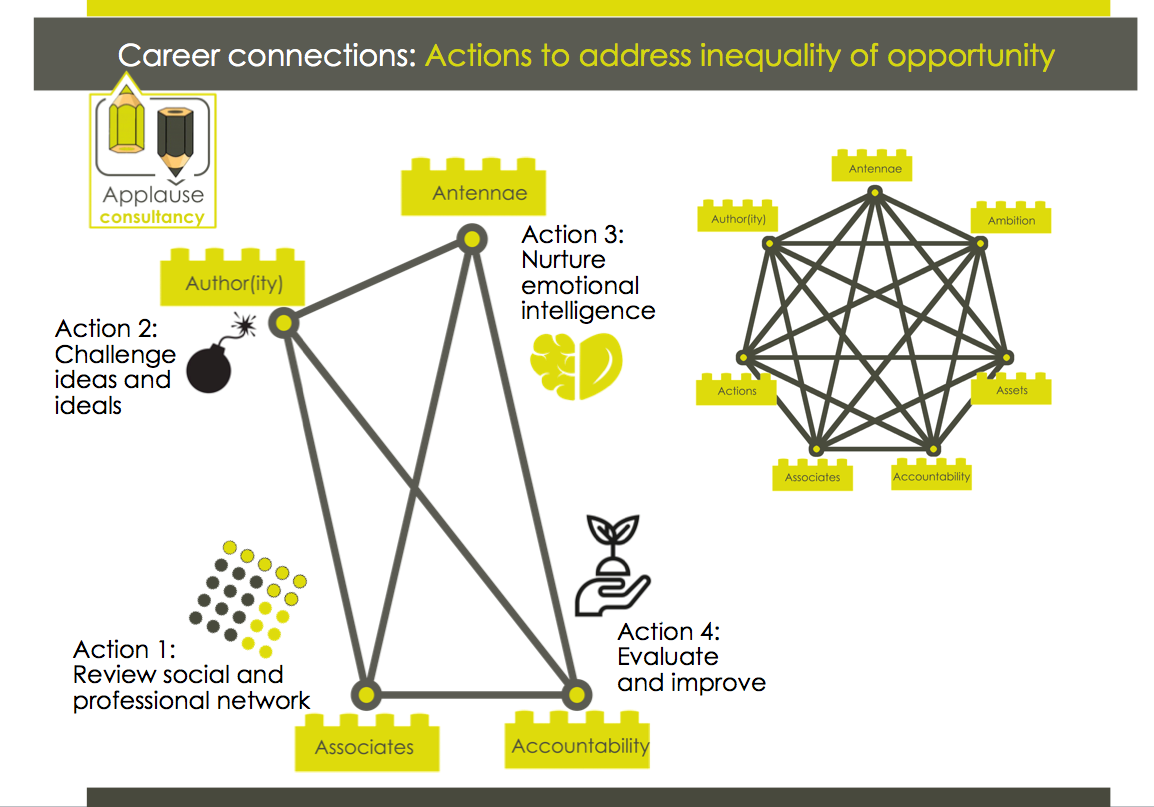Career connections
Using agency and advocacy to address inequality of opportunity in public relations

About the author
Heather is a key member of our assessor team. PhD, BSc, PG, RSA, CAM

Reading the Twitter thread posted by Elizabeth Bananuka, alongside the many responses it has prompted over the past week, has been a stark reminder of the systematic and systemic barriers faced by Black women and men working in PR.
As Bieneosa Ebite writes: “The reality is the UK PR industry is predominantly white because there is an institutionalised problem with race”.
The painful and frustrating experiences shared by Black practitioners about working in public relations evidence the impact of racial discrimination on career opportunity for a large number of talented individuals.
The dominance of Whiteness in the occupation raises questions concerning social conditioning – how those who choose public relations as their career are taught and learn, about the culture, norms, conventions and practices of working in this industry. A similar analysis is required into how careers are understood and managed. I will examine these aspects in a future article.
Normally I consider career challenges from the point of view of individuals looking to upscale the quality or value of their career. This reflects a view from career theory that individual agency is the key to contemporary career success.
The individualistic model of careers derives from Parsons’ work in 1909 on finding a fit between occupations and what was then a predominantly White male workforce. In its modern guise, individualism presumes equality of both opportunity and ability to make career choices.
The potential for bias and prejudice is clear in language that still calls for recruitment of the right ‘breed’ or ‘quality’ of person’ who has ‘a good personality’ and reflects the ‘typical traits’ required for success in PR careers.
Within public relations there is long-standing evidence of a narrative of social closure that favours the class, gender, age, nationality, race, and cultural background of an established occupational demographic.
Moving into, around and upwards in the occupation is then a matter of using a revolving door of privileged access. Today this means there is a clear career advantage for those who are White, private school and Russell University educated, well-connected, London-centric, and predominantly (but not exclusively) male.
Historically, women were able to build careers in public relations through personal agency – if they complied with norms of feminine personality and behaviour. Contemporary experiences shared by Black women echo this expectation.
Indeed, increased diversity within the occupation has tended to follow a market-led attitude that employment – and career development – is competitive and driven by what is good for business or an employer’s reputation.
When there is such a systematic/systemic problem, it cannot be resolved simply by offering career advice to individuals. There is a need for structural change and, at the least, greater use of proxy and collective agency to create this.
Using the agile framework set out in my previous article, Career building blocks, my intention is to suggest four meaningful actions that can be taken, particularly by those with the economic, social and cultural capital – that is, power – to effect change.
The objective for all of us should be to listen, learn and use our voice, advocacy and ability to influence to make a genuine – and lasting – difference.

Action 1: Review your social and professional network of associates
Associates are our connections. As a career building block, associates (individuals, groups and networks) have an influence on career capital. Specifically, it is those we associate with who can enhance the relationship assets that deliver career benefits.
There is a tendency for individuals to associate with others who are similar to them (known as homophily). By reviewing your social and professional network of associates, you can assess the extent to which it reflects social closure.
If your associates are homogenous in terms of race and ethnicity, this will limit your understanding of others’ perspectives and experiences. Such homophily has an effect on both individual careers and the success of teams and organisations.
Developing an open relational matrix of associates encourages you to expand the breadth of emotional and practical career support available for Black PR practitioners. You could look for opportunities to become a career stakeholder:
- Enablers: make a commitment to supporting someone’s career success;
- Partners: make an active contribution to achieving their career ambitions.
You should also look to generate multi-directional career encounters – occasions that create positive experiences for others that will boost their career capital. This can be via social media, through online conversations or face-to-face when possible.
Action 2: Challenge your ideas and ideals about author(ity)
Author(ity) is social power given to others. For career development we need to listen and learn from authors and authoritative voices – those who have legitimacy as experts in an occupation or domain.
Reflect on the books you read, those whose ideas you cite, who you recommend to others. How diverse and inclusive are these sources that influence your thoughts and behaviour? Do they make you question your worldview and encourage critical thinking, especially regarding matters of race and ethnicity?
It’s vitally important to educate yourself. Where you have responsibility for educating others, there is an existing body of research and literature you can consult about PR and race, including intersectionality. Some authors, links and sources are provided at the end of this article.
Examine yourself as an author – someone with a voice and authority to influence others in your words and deeds. Are you aware of your power to uplift or knockdown? Be informed and act wisely.
Challenge your ideas and ideas about who has/should have authority. Don’t prejudge anyone on the basis of looks. Make space and advocate for Black PR practitioners to be seen, heard, understood, welcomed and recognised as authoritative.
Action 3: Use your antennae to nurture emotional intelligence
Antennae help us make sense of our environment. They provide a mechanism to learn and improve. We use our senses to adapt and gain self-awareness.
Being mindful of other people and how they sense the world is vital if together we are to remove barriers and create equality of opportunity for Black PR practitioners. This means taking time to watch and listen instead of focusing on being seen and heard. Be sensitive and feel your way in unfamiliar environments – rather than imposing your opinions in areas where you lack authority.
Explore a wide range of tastes – for instance in music, art, sport, food, literature, theatre, travel and popular culture – and be open to learning about interests and lifestyles that differ from your own.
Seek the input of others into your career and choices, and respect the decisions and ambitions they make in their careers.
Use your social antennae to nurture emotional intelligence by:
- Acknowledging your own and others’ feelings in any situation;
- Attending to the social signals you give out and notice in others;
- Accessing your emotions to control impulses and react with kindness;
- Adjusting your temperament to find calmness, empathise and make good choices.
Action 4: Be accountable for your personal agency in effecting change
Accountability means being prepared to evaluate your agency and adapt from understanding where you need to improve. It involves holding yourself to account, and expecting others to do likewise.
Decisional accountability is a responsive and agile way to demonstrate your ability to do the right thing, in the right way. It should be at the heart of any PR practitioner’s professional practice.
Making a commitment to examine our motivations and intentions (not just our actions or the consequences of these) is a guiding ethical principle. We can do this through techniques that underpin reflective and critical thinking. Critical reflection can be applied in practice by developing performance indicators that examine and evaluate barriers within structures, processes, decisions, actions and outcomes within our own organisations – and reporting measurable change.
In relation to addressing racial inequality in careers, social accountability concerns the values we bring to our work, and how we employ our personal agency to effect change. This includes using proxy agency to advocate and support others, and collective agency, where we can collaborate as activists to remove systemic and systematic barriers to change.
We also have to stand up and challenge others to be accountable for their intentions and behaviours. In addition, professional bodies need to address racial discrimination pro-actively through education and applying their codes of conduct. There is enough evidence to question the value of launching initiatives that make promise but don’t deliver real impact and sustainable change.
Read more:
- BME PR Pros: https://bmeprpros.co.uk/
- Dr Lee Edwards (research and publications): http://www.lse.ac.uk/media-and-communications/people/academic-staff/lee-edwards
- The Museum of Public Relations: Black PR Prioneers: https://www.prmuseum.org/black-pr-pioneers
- Institute for Public Relations: https://instituteforpr.org/barriers-borders-and-boundaries-exploring-why-there-are-so-few-african-american-males-in-the-public-relations-profession/
- Intersectionality: https://www.aaup.org/article/what-intersectionality-and-why-it-important#.XuEL0PJ7k60
- The case for Black with a capital B: https://www.nytimes.com/2014/11/19/opinion/the-case-for-black-with-a-capital-b.html